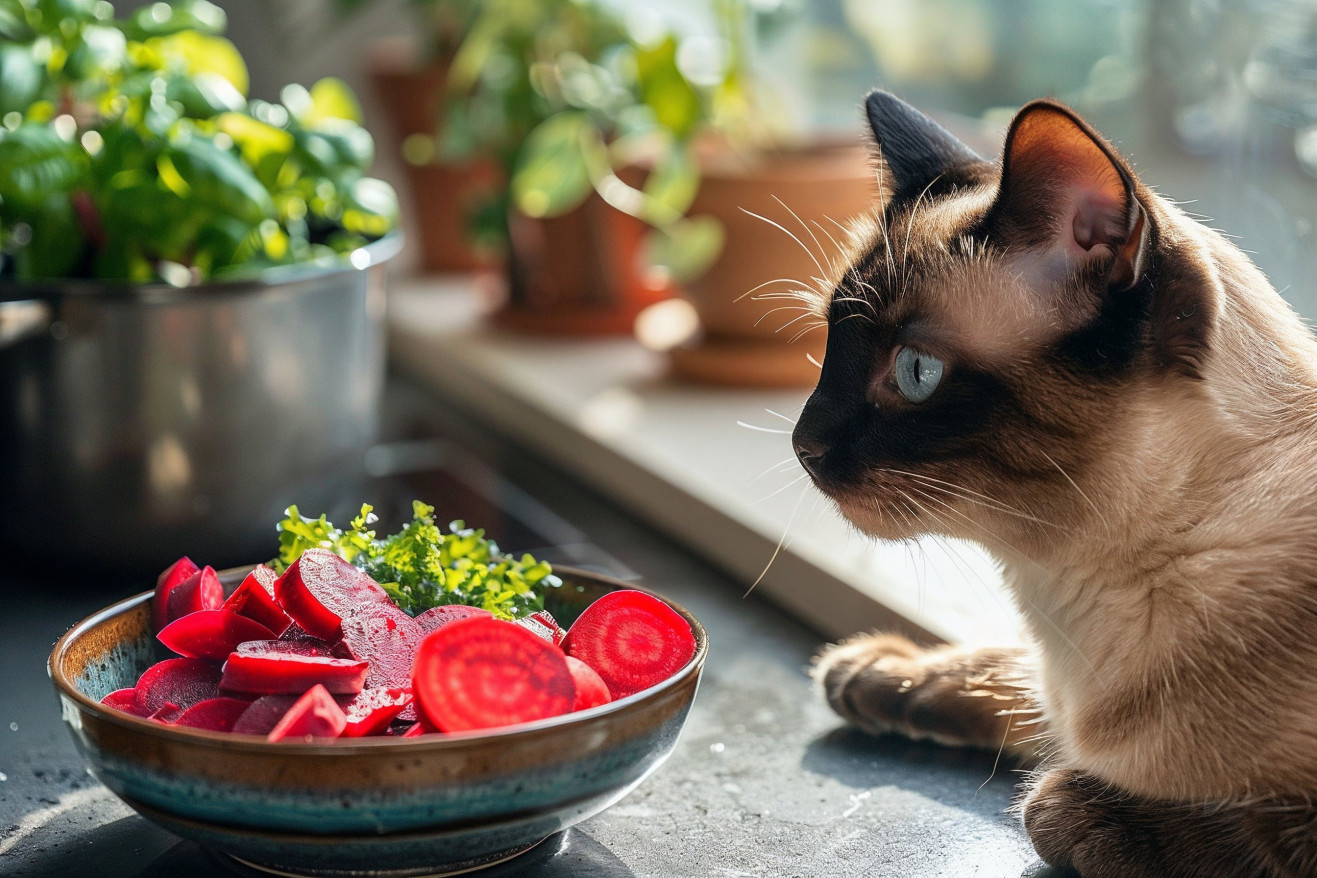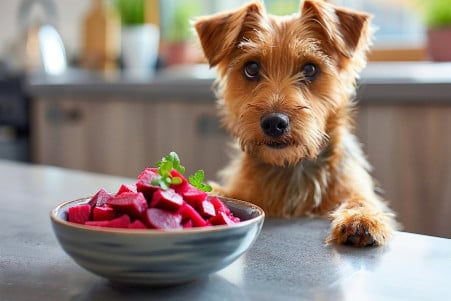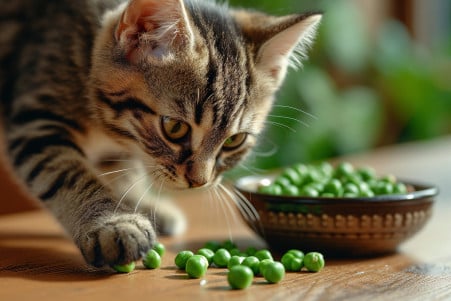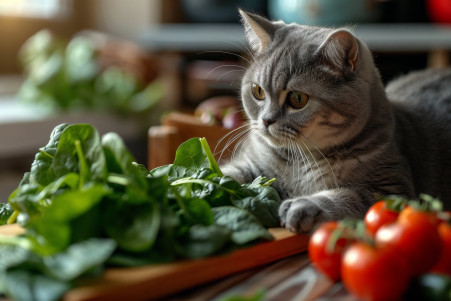Can Cats Eat Beets? A Guide to Feline Friendly Diets
16 March 2024 • Updated 14 March 2024

If you love the taste of beets, you may be wondering if your cat does too. While beets are safe for cats to eat in small amounts, they shouldn’t be a regular part of a cat’s diet because they are high in sugar, which can lead to health problems like diabetes and obesity.
This article will explore the ins and outs of feline nutrition and biology to help you understand where vegetables like beets fit into a cat’s primarily carnivorous diet. To do this, we’ll look at information from veterinarians, nutritional experts, and scientific research on cat health and digestion.
By the end of this in-depth article, you’ll have the information you need to decide whether or not to feed your cat beets and how to do so in a way that supports your cat’s health.
Can cats eat beets?
Feline Nutrition: Do Cats Need Vegetables?
Cats are obligate carnivores, which means that their bodies are adapted to get most of their nutrition from animal protein, explains Cornell University College of Veterinary Medicine. In contrast to omnivores, cats’ digestive systems are not well-suited to digest plant material. Cats need several nutrients, including taurine, arachidonic acid, and vitamin A, that are found in animal tissues and can’t be made from plant-based sources.
While vegetables can offer some nutrients and aren’t toxic to cats, they aren’t a major part of a cat’s diet. In fact, VCA Animal Hospitals notes that while some cats may eat plants on occasion, they don’t have the metabolic pathways needed to properly digest plant material, indicating that cats don’t need vegetables in their diet.
One common myth is that cats need a variety of plant-based foods to get a well-rounded diet. However, according to Countryside Veterinary Clinic, a high-quality commercial cat food will contain all of the essential nutrients without the need for vegetable supplements.
If you’re working with a veterinarian, you may be able to give your cat a small amount of certain vegetables on occasion, but this is mostly for fun or to help with specific health concerns.
It’s important to keep in mind that while cats can tolerate a small amount of carbohydrates, their nutritional needs are very different from other animals and need to be met with precision and care.
How Sugar Affects Cats
Cats are obligate carnivores, meaning their diet should be low in carbohydrates, and therefore, a sudden increase in sugar, like that found in beets, may not be in line with their natural metabolic needs.
A study in PMC shows that domestic cats have the same dietary needs as their wild ancestors, who ate a diet that was high in protein and low in carbohydrates, and therefore their metabolism has evolved to be able to efficiently use nutrients from animals.
This means that a high-carbohydrate diet can lead to the same issues in cats as it does in humans, including feline obesity and diabetes mellitus, both of which have been associated with high sugar intake.
These issues are similar to human diabetes, according to the Cornell University College of Veterinary Medicine, and it shows that it’s important to make sure that cats have the right amount of sugar in their diet.
Because cats have a limited ability to digest sugar, a high-sugar diet can lead to immediate gastrointestinal issues and long-term health problems. While cats can digest some cooked and processed carbohydrates, research shows that their bodies aren’t well-equipped to handle a high-sugar diet.
This means that it’s important to make sure that cats are getting the right amount of sugar in their diet, and that any introduction of vegetables like beets is done with care and with the help of a veterinarian to avoid potential health problems and make sure that cats’ nutritional needs are being met.
The Cat’s Digestive Tract
The cat’s digestive tract, from the mouth to the large intestine, is a highly efficient, direct system that is well-suited to processing animal-based proteins. Food moves from the mouth, through the esophagus, and into the stomach, where it is broken down by stomach acids. The small intestine then absorbs the nutrients, and the large intestine takes over to absorb water and ferment any fibers that were not digested in the small intestine.
Unlike herbivores and omnivores, cats have a digestive system that is not well-suited to processing plant-based foods like beets. The digestibility of the protein is especially important for cats, and while cats can handle some plant proteins, the impact of different sources of plant proteins can be quite different.
A paper from PMC notes that the addition of plant sources like corn gluten meal to the diet can increase the protein digestibility of cats, showing that cats can adapt to some plant-based nutrients.
However, the addition of vegetables can also lead to potential digestive issues like indigestion and diarrhea, which is something to be aware of.
In addition, cats may have a hard time digesting fibrous plant material, which can lead to gastrointestinal problems. The unique physiology of cats, which is designed for high protein and low carbohydrate intake, shows that cats are obligate carnivores and that caution should be used when adding plant-based foods to their diet.
Fiber in Cat Diets
Fiber in cat diets can be broken down into two main categories: soluble, which dissolves in water to form a gel in the intestines, and insoluble, which doesn’t dissolve and helps to add bulk to the stool. Soluble fiber can slow stomach emptying and improve nutrient absorption, while insoluble fiber can help with constipation and hairballs, according to PetMD.
Fiber helps to support gut health and may aid in weight management for cats, so it comes with several benefits. Nom Nom explains that some fermentable fibers can help to promote gut health by creating short-chain fatty acids that feed the cells in the intestines. In addition, research has shown that dietary fiber can help with diabetes management in cats by improving glucose control.
That said, there are also potential downsides to including fiber in a cat’s diet. Since cats aren’t designed to consume a lot of fiber, a high-fiber diet can lead to reduced digestibilities of nutrients and protein, constipation, and even increased requirements for essential amino acids like taurine, according to Nom Nom.
Because of these potential downsides, it’s important to add fibrous foods like beets to a cat’s diet carefully and with the help of a veterinarian. It’s also important to consider the potential downsides of fiber in light of the specific needs of cats to ensure their health and well-being.
Assessing Veggies in Your Cat’s Diet: From Beets to Other Options
While beets are not toxic and can be eaten by cats, they are higher in sugar than other vegetables that may be included in a cat’s diet. Catster suggests green beans, broccoli, and peas as vegetables to add to your cat’s diet because they are high in fiber and important nutrients like vitamins A, C, K, and minerals like iron and potassium.
These vegetables are a better option because they are lower in sugar and have other beneficial properties.
As Darwin’s Pet Food explains, cats are obligate carnivores and don’t require vegetables for their diet, but they can enjoy some vegetables as a supplement. For example, cooked pumpkin is high in fiber and can help with digestion, while spinach, while high in vitamins, should be given in moderation because it can contribute to bladder stones.
Sunvet Animal Wellness says indoor cats can benefit from greens and grasses, which provide micronutrients and support the digestive system. This can include safe houseplants and specially grown grasses like wheatgrass, which contains a variety of vitamins and minerals.
By learning about the nutritional value and potential drawbacks of different vegetables, cat parents can make informed choices about adding them to their cat’s diet. While beets can be added from time to time, it’s important to focus on vegetables that are more in line with a cat’s nutritional needs, like those that are lower in sugar and higher in fiber, and to do so with the guidance of a vet.
Conclusion: Cats and Beets
So, while beets aren’t necessarily bad for cats, they’re also not the best choice for your pet. Knowing that cats are obligate carnivores with specific dietary requirements, we can make sure that their diets are mostly meat-based, with vegetables like beets playing a smaller, if any, role.
The high sugar content in beets can lead to diabetes and obesity in cats, so it’s important to make sure that they’re only included in a cat’s diet in moderation.
This investigation has also shown how important it is to work with a vet when it comes to feeding our pets. Just as we’re mindful of what we eat, we need to be mindful of what we feed our cats, taking their digestive systems and dietary needs into account.
With all of this in mind, the bottom line for cat owners is that animal-based foods should be a priority and plant-based foods should be used sparingly. By making conscious and educated decisions about what we feed our cats, we can help them live long, healthy lives.


